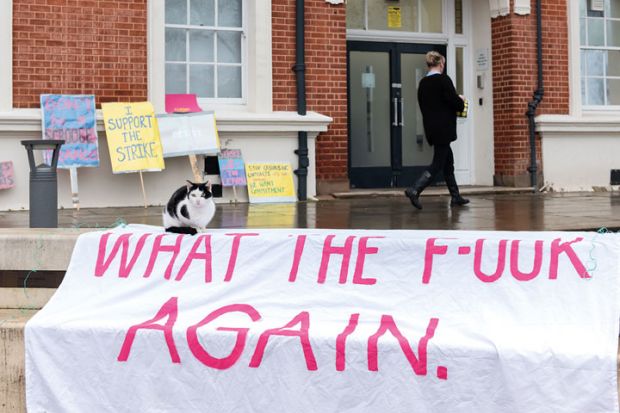A messy dispute over the future direction of industrial action across UK universities is set to be resolved, with more strikes likely despite employers offering a pay rise of about 5 per cent on average.
The University and College Union’s higher education committee (HEC) will meet on 12 January to finalise a strategy for strikes and other forms of industrial action covering the crucial period between now and when the union’s mandate for action expires in April.
Representatives meet as the Universities and Colleges Employers Association (Ucea) revealed its opening offer for the 2023-24 pay round. This would amount to a 7 per cent rise for those earning less than £22,662, with a sliding scale of increases through the pay bands up to a 4 per cent rise for the higher paid.
If the offer is agreed by the unions, part of the rise would come in February, with the rest following in August. In a letter outlining the proposal, Ucea chief executive Raj Jethwa said that “while employers have a great deal of sympathy with staff coping with cost of living pressures, no HEI [higher education institution] could offer a pay award that would get close to current levels of inflation”.
The UCU’s general secretary, Jo Grady, has indicated that the union will reject the offer, tweeting that it is “not enough yet”. This means that any strategy decided by the HEC is likely to go ahead, with the union split between several different options and strongly held views on either side meaning the row is likely to have long-reaching repercussions.
Those who have argued for a period of “escalating action” – led by Dr Grady – have been buoyed by the backing of delegates from UCU branches who voted at a meeting on 10 January to support “days of action” in February, March and April. This won the support of 57 per cent of branches, compared with the 31 per cent who favoured calling an “indefinite strike”.
A marking and assessment boycott – originally pencilled in for 23 January – could also now be moved to April after another indicative vote showed that delegates preferred this option by 56 per cent to 26 per cent.
But the HEC might still go against Dr Grady and the view of branch delegates, having already backed an indefinite strike at its November meeting.
Supporters of a long walkout insist that there is still all to play for and say achieving a third of the vote was a success – particularly as they have accused the union’s leadership of trying to give more prominence to their own preferred strategy.
Saira Weiner, a senior lecturer at Liverpool John Moores University who sits on the HEC and has backed indefinite action, said the vote result was “amazing”. The committee would take into account the motions of branches, many of which have favoured indefinite strikes, she said, adding: “It’s certainly not a binary choice for us.
“Our union has to be prepared to take unprecedented levels of action, if possible alongside those in other sectors who are fighting back,” she said. “We have a huge democratic mandate for action; we should use it to the full.”
At an online public meeting of the union on 9 January, Dr Grady insisted that she would seek to unite members behind whatever strategy is decided.
While she had sympathy for the idea of an indefinite strike, she said, it would be too complicated in a national dispute that covers 150 universities and could “burn everybody out” when industrial action was likely to be needed “well into 2023”.
The union’s strike fund – which would be used to reimburse members who lose out on wages by striking – has been reduced from £2.9 million in October 2021 to £1.5 million in October 2022, Dr Grady revealed. Although this was still a “healthy position”, it could sustain members for only a “matter of weeks”, she said.
Dr Grady said the union had sought advice on a third option involving members striking for four days a week – known as “discontinuous indefinite action” – which has gained support from some influential figures in the union. The idea is favoured as a way of ensuring that members still receive some pay and can therefore keep action going longer, but Dr Grady said employers could still impose 100 per cent deductions, as they had done during previous marking boycotts.
Gregor Gall, a research associate at the University of Glasgow and an expert on industrial relations, said some members of the HEC appeared to remain convinced that “all-out striking is what is needed to win the dispute”.
But, he said, this strategy is “more high-risk because if such a strike was patchy or crumbled, it would leave members financially much worse off and the union much more weakened”.
“The strategy of more circumspect escalation is, therefore, more likely to appear as more sensible and less risky,” he added.
The UCU has indicated that the results of the crunch meeting will not be revealed straight away. Union negotiators will again meet with Ucea for the third meeting of pay negotiations on 16 January.
Register to continue
Why register?
- Registration is free and only takes a moment
- Once registered, you can read 3 articles a month
- Sign up for our newsletter
Subscribe
Or subscribe for unlimited access to:
- Unlimited access to news, views, insights & reviews
- Digital editions
- Digital access to THE’s university and college rankings analysis
Already registered or a current subscriber? Login








